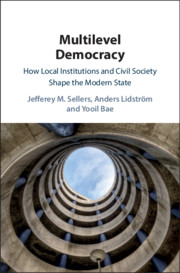Crossref Citations
This Book has been
cited by the following publications. This list is generated based on data provided by Crossref.
Tatham, Michaël
Hooghe, Liesbet
and
Marks, Gary
2021.
The territorial architecture of government.
Governance,
Vol. 34,
Issue. 3,
p.
607.
Lidström, Anders
and
Feltenius, David
2021.
Close Ties in European Local Governance.
p.
353.
Le Galès, Patrick
2021.
The Rise of Local Politics: A Global Review.
Annual Review of Political Science,
Vol. 24,
Issue. 1,
p.
345.
Heinelt, Hubert
Teles, Filipe
Gendźwiłł, Adam
and
Stănuş, Cristina
2021.
Close Ties in European Local Governance.
p.
379.
Teles, Filipe
Gendźwiłł, Adam
Stănuş, Cristina
and
Heinelt, Hubert
2021.
Close Ties in European Local Governance.
p.
1.
Lidström, Anders
2021.
European Regions, 1870 – 2020.
p.
83.
Lidström, Anders
2021.
Prefects, Governors and Commissioners.
p.
255.
Hermelin, Brita
and
Persson, Bo
2022.
Local development policy in a societal crisis: municipal–industry dialogues in Sweden during Covid-19.
Territory, Politics, Governance,
p.
1.
Teles, Filipe
2022.
Perspectives on Local Governance Across Europe.
p.
17.
Lidén, Gustav
and
Nyhlén, Jon
2022.
Local Migration Policy.
p.
1.
Bučaitė-Vilkė, Jurga
Lysek, Jakub
and
Lazauskienė, Aistė
2022.
Perspectives on Local Governance Across Europe.
p.
205.
Verhelst, Tom
and
De Ceuninck, Koenraad
2022.
Perspectives on Local Governance Across Europe.
p.
117.
Hovik, Sissel
Legard, Sveinung
McShane, Ian
Middha, Bhavna
Reichborn-Kjennerud, Kristin
and
Ruano, José M.
2022.
Citizen Participation in the Information Society.
p.
25.
Hovik, Sissel
and
Giannoumis, G. Anthony
2022.
Citizen Participation in the Information Society.
p.
1.
Ek Österberg, Emma
and
Zapata, Patrik
2023.
Activation of unemployed through social procurement: from policy to practice.
Innovation: The European Journal of Social Science Research,
p.
1.
Leão Marques, Eduardo Cesar
2023.
Continuity and Change of Urban Policies in São Paulo: Resilience, Latency, and Reanimation.
Urban Affairs Review,
Vol. 59,
Issue. 2,
p.
337.
Myksvoll, Thomas
2023.
Conditional support from below? Understanding the dynamics of municipal amalgamation preferences among local politicians.
Regional & Federal Studies,
p.
1.
Klausen, Jan Erling
and
Torsteinsen, Harald
2023.
Corporatisation in Local Government.
p.
429.
Jatau, Victoria
and
Maza, Kangdim Dingji
2023.
Democracy, Peace, and Religion in Nigeria: Can Religion Be Used to Consolidate or Undermine Democracy and Peace?.
Religions,
Vol. 14,
Issue. 10,
p.
1305.
Vabo, Signy Irene
Fimreite, Anne Lise
and
Houlberg, Kurt
2023.
Why such a different choice of tools? Analysing recent local government reforms in Denmark and Norway.
Local Government Studies,
Vol. 49,
Issue. 2,
p.
355.



